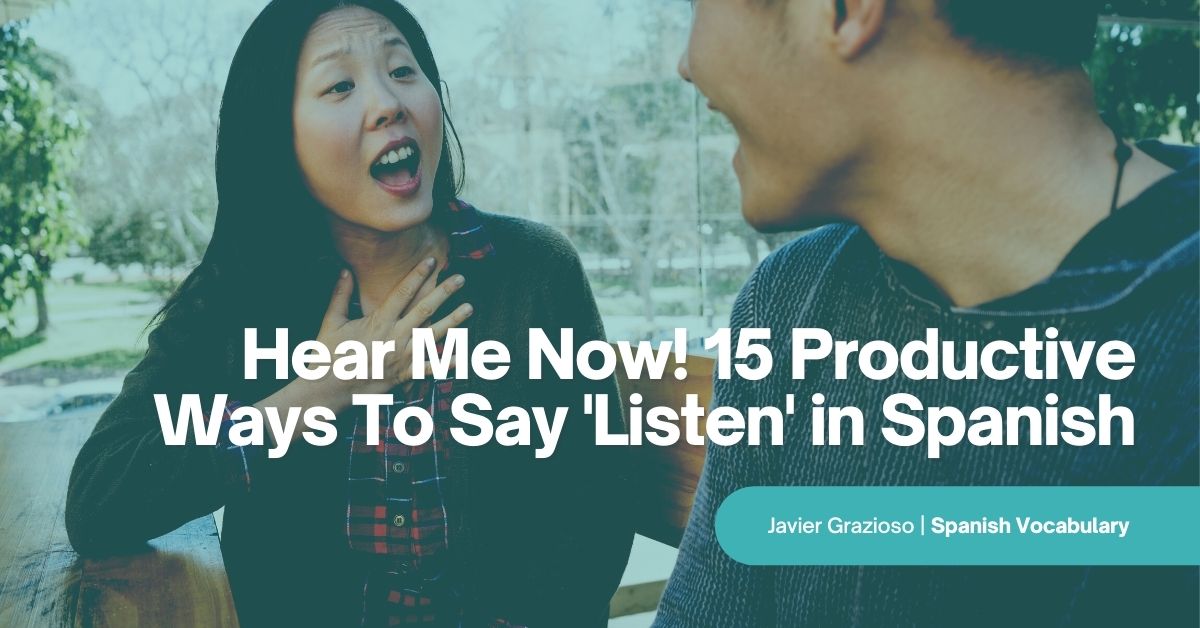How To Say Listening In Spanish

Hear Me Now! 15 Productive Ways To Say 'Listen' in Spanish
Escucha is "listen" in Spanish, and as you can expect, in that location are many ways to call for someone's attending in this all-encompassing language.
Join me as I explore fifteen different and productive ways to say "listen" in Spanish. I will likewise include 7 more phrases you lot can utilise to demonstrate active listening in your Spanish voice communication.
Listen in Spanish
As in every other language, there are different ways to get someone's attention according to the setting and context. Imagine sharing a tabular array in a Latin household—yous could become the attention of your friend sitting on the other end by loudly request him, ¡pásame el picante! (pass me the hot sauce), for case.
Check out this interesting article on Escuchar vs Oír: What's the Difference Between These 2 Spanish Verbs?
Here is a quick guide to the uncomplicated conjugation of escuchar in Castilian.
Conjugation of Escuchar – Elementary Present
| English | Castilian |
| I heed | yo escucho |
| yous listen | tú escuchas, vos escuchás |
| he, she listens | él, ella, usted escucha |
| we listen | nosotros escuchamos |
| y'all listen | vosotros escucháis, ustedes escuchan |
| they mind | ellos o ellas escuchan |
Remember that in Castilian, using the subject is completely optional since we have different conjugations for every person (except ustedes and ellos). Omitting the subject actually makes you lot audio more like a native.
Conjugation of Escuchar – Simple By
| English | Spanish |
| I listened | yo escuché |
| you listened | tú, vos escuchaste |
| he, she, you (formal) listened | él, ella, usted escuchó |
| we listened | nosotros escuchamos |
| you lot listened | vosotros escuchasteis, ustedes escucharon |
| they listened | ellos o ellas escucharon |
Conjugation of Escuchar – Simple Future
| English | Castilian |
| I will heed | yo escucharé |
| you lot volition listen | tú, vos escucharás |
| he, she, you (formal) will listen | él o ella escuchará |
| we will listen | nosotros escucharemos |
| you will listen | vosotros escucharéis, ustedes escucharán |
| they will heed | ellos o ellas escucharán |
Conjugation of Escuchar – Imperative (or Commands)
| English language | Spanish |
| you listen! | tú escucha, vos escuchá |
| he, she, you lot (formal) listen! | él, ella, usted escuche |
| we listen! | nosotros escuchemos |
| you listen! | vosotros escuchad, ustedes escuchen |
| they listen! | ellos o ellas escuchen |
PRO TIP! Check this out if y'all'd like to get more familiarized with the imperative mood.
fifteen Ways To Say "Listen" in Castilian
Here are 15 different and productive ways to say "listen" in Spanish.
i. Escucha
Let'south start off with the almost bones command of them all, escucha. When you're talking to anyone and you desire to telephone call their attending a little chip more because the next thing you're about to say is peculiarly of import just say escucha or escuche (if you lot're talking to an older person or using the formal you).
Imagine you lot're talking to a friend about who's the best baseball game histrion e'er. He's saying Babe Ruth and y'all're saying Willie Mays.
The chat goes like this:
—Babe Ruth es el mejor beisbolista del siglo, lo dice la AP.
—Es cierto lo de la AP, pero escucha…
—Baby Ruth is the best baseball thespian of the century, the AP says and then.
—The fact virtually the AP is truthful, only listen…
2. Escúchame
So, what'south the difference between escucha and escúchame? Past adding an indirect object to the verb nosotros give more emphasis to it, therefore, the person listening to us should pay a bit more than attending.
Movie a situation where a toddler is throwing a tantrum and his mother wants to calm him downwardly, she would say something similar:
Escúchame, mi amor, calma.
Heed to me, my dearest, (be) at-home.
3. ¡Oye tú!
In this case, nosotros're focusing on the verb oír which literally ways "to hear" only information technology works just too to call somebody's attention.
Imagine that yous're walking down the street and yous come across a guy wearing your favorite squad'southward shirt, but he'due south not close, yous'd yell something similar:
¡Oye tú! ¡El de la camiseta de los Saints…!
Hey y'all, the one in the Saints shirt…!
PRO TIP! The verbs escuchar and oír might be interchangeable in some situations, but they don't piece of work like that all the time.
4. ¡Atención!
The give-and-take atención literally means attention and Castilian speakers can interpret information technology like an imperative, without information technology beingness a verb. Yous can use this word in several situations, a sergeant talking to their soldiers, a team captain talking to their squad, or a teacher talking to their students.
If you want to say listen up in Castilian a common phrase you can use to call a lot of people's attending is:
¡Atención, muchachos!
Listen up, guys!

v. Pon mucha atención
Hither we can go on with the word attention. The phrase pon mucha atención ways "pay shut attention." The outset verb literally means put and not pay. Y'all can change this verb for the verb presta and say presta mucha atención. Both work perfectly.
If you're explaining a really complicated procedure or a highly of import role of a programme it is user-friendly to say:
Presta mucha atención a lo que estoy por decir.
Pay close attention to what I'm about to say.
6. Haz caso
Haz caso is an effective way to tell someone to listen and as well to obey. Combining it with an indirect object gives it more emphasis and makes it sound much better. If you acquire the hacer (to practice or to make) conjugation you should be able to call people's attending in an effective way.
Imagine you're pedagogy a little kid'southward class and one of them is talking loudly after you told them non to practice and so, you could say something similar this:
Hazme caso y deja de hablar tan alto, por favor.
Listen to me and cease talking so loudly, please.
PRO TIP! Don't confuse haz with has. The first one is the imperative class (in the second singular person) of the verb hacer, while has is the indicative class of the second person of the verb haber.
7. Toma nota
Another fashion to say listen in Spanish is toma nota. This literally means "have annotation" which is something close to pon atención.
If you desire to say "listen to the instructor" in Spanish, you can say escucha al maestro.
If you lot're the instructor and want to tell your students to pay special attending to something someone said you can say:
Tomen nota de lo que su compañero dijo, vendrá en el examen.
Accept note of what your classmate said, it'll be on the test.

8. Sigan escuchando
We're back to the verb escuchar considering this is truly one of the about effective and best verbs yous can employ. A lot of radio hosts or podcasts creators employ the phrase "stay tuned," and how practice you say that in Castilian? Sigue (o sigan) escuchando.
If you desire to outset a podcast or channel on YouTube and would like to create a community that keeps enjoying your content, yous can say something like:
Sigan escuchando que la próxima semana volveremos con más.
Stay tuned, because adjacent week we'll be dorsum with more than.
ix. Fíjate
The word fijate is not very compatible with the English language, but it comes from the verb fijar (to set). While nosotros use this word to call someone'due south attention visually, y'all can also apply information technology to call someone'due south attending in a listening-kind-of-manner.
Fíjate en cómo le dijo que lo amaba, no me convence.
Observe how she told him she loved him, it doesn't convince me.
FUN FACT! If you lot hear a Guatemalan saying the phrase fíjese que… yous might also ready to hear an alibi. People use that phrase to soften a negative response.
ten. Entérate
The verb enterar means to find out in Spanish. We tend to utilise this verb a lot when we gossip effectually, but journalists can also call your attention past saying:
Entérese de las últimas noticias aquí.
Find out about the latest news hither.
PRO TIP! Don't confuse enterar (to discover out) and enterrar (to bury), ane letter can make all the deviation.
11. Presta oído
Presta oído means listen in Spanish slang. This i literally ways something like "lend your hearing ability."
Picture a couple of friends talking almost the most recent episode of their favorite show, one of them could tell the other one:
Presta oído a lo que die ahora.
Pay attention to what she says now.
12. No te distraigas
In this example, we are using a negative imperative to call someone's attention. We are maxim "don't get distracted" in Castilian.
Imagine that you're trying to explain something to your 12-year-old kid, he is there, in front of yous but he is rolling his eyes and playing with a ball while he pretends to listen, merely say:
No te distraigas que te estoy hablando.
Don't get distracted because I'yard talking to you.
13. Atiende
The verb atiende ways "to serve" or "to take care of" near of the time, just y'all can as well utilize it to say "listen" in Spanish.
Imagine you're trying to tell your friend nigh your new job but he keeps looking at his phone and scrolling downwards his Instagram feed—before saying ¡qué maleducado! (how rude), try saying:
Atiéndeme, por favor, que te estoy contando algo importante.
Listen to me, delight, because I'm telling you something important.
PRO TIP! Sometimes you can hear the phrase atiende el teléfono, which means "choice upwards the phone" rather than "listen to the phone."
14. ¡Hey!
There's not much to say about this word since it's also part of the English language language. This can either sound like in English or you can pronounce it like ey.
If your older child is bothering your younger child you can call his attention past proverb:
¡Hey! No seas así con tu hermano.
Hey! Don't deed similar that to your blood brother.
15. Perdona
Await, isn't perdón or perdona saying sorry? Yes, information technology is, but when we don't know a person and need to interrupt them to ask for something, we can use this word equally an introduction.
Perdona, ¿me puedes decir dónde está esta dirección?
Alibi me, can yous tell me where this is?
7 Ways To Demonstrate Active Listening in Spanish
Active listening is a key factor in any type of conversation, and it is sometimes essential to communicate that you are listening to someone to keep the advice flowing.
As the Dalai Lama says, "When you lot speak you only repeat what y'all already know; but when you mind yous might learn something new." ("Cuando hablas solo repites lo que ya sabes; pero cuando escuchas puede que aprendas algo nuevo.")
In the next section, I will include seven useful ways to communicate that yous're listening actively in Spanish.
1. Te estoy escuchando
This 1 is the most straightforward. Here yous're saying: "I'm listening (to y'all)." And then if your friend has been talking for 25 minutes on the telephone and you haven't said a give-and-take to them and they want to be certain that you're still there, just say te estoy escuchando.
2. Te oigo fuerte y claro
A pilot, gunkhole helm, or someone who communicates through radio might use this phrase. Simply yous tin can also utilize information technology when there's been a misunderstanding and you want to assess the situation then that information technology doesn't echo itself. If you want to confirm that you've fully understood, but say te oigo fuerte y claro (I hear you loud and clear).
3. Claro
Claro (clear) is something that you tin can say subsequently every sentence that someone says to you (just exist careful considering it tin can get abrasive if you say it too much). This give-and-take means "yep". If yous want to give information technology a footling fleck more power you can say claro que sí which would be saying something similar "of course yes".
4. Entiendo
Entiendo ways "I sympathise." We ordinarily use this discussion in society to express agile listening, but unlike claro, it doesn't necessarily hateful that we agree. Saying entiendo can be good for whatever kind of situation—whether you're talking to your boss, your mother, or your significant other.
5. Dijiste que…
In this instance, nosotros're adventuring ourselves into the earth of reported oral communication. Repeating what someone just said in your own words is one of the all-time means to evidence active listening.
A elementary conversation could go like this:
—Lo encontré riéndose mucho.
—I found him laughing a lot.
—Dijiste que lo encontraste carcajeándose.
—You lot said you establish him laughing a lot.
vi. Lo siento mucho
This manner of demonstrating active listening is reserved for regrettable situations. You say information technology when you want to exist highly empathetic. When you say lo siento mucho you're saying "I'g very deplorable."
For example, if a friend's pet but passed, you tin can reply by saying:
Lo siento mucho (por lo de tu perrita).
I'thou actually sorry (about your pup.)
7. Solo para corroborar…
This is another great way to demonstrate active listening. When you lot say solo para corroborar you're saying "just to make sure…"
You demonstrate active listening by starting your reply with this phrase.
Solo para corroborar, usted dijo que no quería los vestidos de color rosa, ¿cierto?
Just to make sure, you said that yous didn't desire the pink dresses, right?
Hear Me Now, Acquire More than Spanish!
Being a listener is one of the all-time and most generous traits that a homo being can have! We all capeesh having somebody listening to u.s.. While listening (and understanding) is not bad, speaking is too a highly important function.
Sign upwards for a costless Spanish class today and exercise your listening and speaking skills with one of our friendly Guatemalan teachers. Listening to someone and replying in their ain language is one of the all-time things y'all can exercise.
Just by speaking Castilian, you tin collaborate with 53 million more people in the The states alone—that is without taking into account the other 481 million people who speak Spanish in the rest of the earth.
Want more complimentary Spanish lessons, fun content, and like shooting fish in a barrel learning strategies? Cheque these out!
- Author
- Recent Posts
![]()
Source: https://www.spanish.academy/blog/hear-me-now-15-productive-ways-to-say-listen-in-spanish/

0 Response to "How To Say Listening In Spanish"
Post a Comment